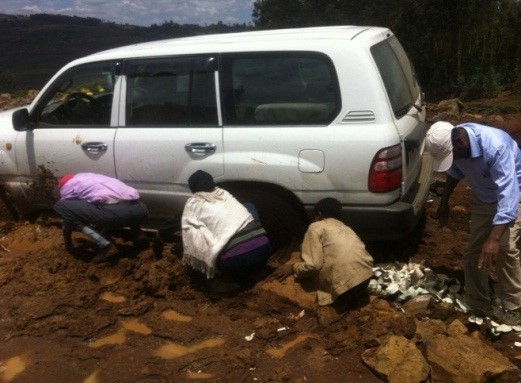Cohort 2 CIRCLE Visiting Fellow
My study aims to investigate land-use
management practices and climate change adaptation and mitigation measures
being implemented in the three districts of the South Wollo Zone, Amhara
Regional State, Ethiopia. From 26, April 2016 to 12 June 2016 I was in the
field collecting data in the rural districts of Borena, Sayint and Mehal
Sayint. The data collection went well apart from a small challenge when our car
got stuck in the mud for one full day due to unexpected heavy rains. It was
very difficult for my driver to remove the car, however, thanks to the local
community and administrators we were able to get the car out.
I conducted group discussions and
interviews with farmers, elderly people, local government sector offices, with
the three district administration leaders, community representatives and honey
bee farmers. The discussions mainly focused on sustainable land management
practices in Borena, Sayint and Mehal Sayint and on the adaptation and
mitigation measures by the communities and the local government.
 |
| Group discussions with local farmers |
The 1991-1992 land distribution allowed
the people to resettle in Borena Sayint National Park which led to severe
deforestation. As a result, dramatic land use changes have occurred through
violating previous boundaries of the Park particularly from Mehal Saynt district
side. The locality is affected seriously by the effects of climate change,
which has led to increasing temperatures and a reduction of rainfall,
intensified by deforestation for the purpose of agricultural land, firewood and
construction.
However, efforts are currently underway to mitigate the effects of climate change. Currently, farmers in the study districts, along with national Sustainable Land Management (SLM) and Climate Resilient Green Economy (CRGE) strategies, have been assigned 30 to 60 days/year free labour for soil and water conservation activities to restore the ecology and adapt to climate change. Large area closures are developing with the aim of restoring the land and biodiversity.
 |
| Farmers working on terracing for soil and water conservation |
Since returning from the field I have
now organized and analysed my data and am currently writing articles for
publication in this quarter, based on these observations.
Capacity Building Training
With the recommendation of my
supervisors and the Department of Environmental Sciences, I had the privilege
to participate in the academic writing training workshop organized by my host
institution, the University of South Africa (UNISA). The training was presented
by Emerald Publishing Group on “scholarly publishing” from 10-11, March 2016
and by Elsevier on 06 September 2016. The two training workshops were very
useful because they targeted how to write publishable articles for academic
journals.
Conference Participation
With the sponsorship of CIRCLE I have
participated in the Environmental Education Association of Southern Africa(EEASA) 2016 conference from 3-6 October 2016 in Johannesburg, South Africa. I
presented some of my research findings and gained much from the workshop. It
helped me to create networks with experienced professionals from different
countries within and outside Africa to work together in the future.
Support during CIRCLE
Since the start of the programme the
support obtained from the CIRCLE team- ACU, AAS, Wollo University (home
institution), UNISA (host institution) has been excellent. As far as my questions
have been aligned with the CIRCLE objectives and policies, the support from all
the CIRCE team in every aspect of my career development has been great.
I am also very grateful to my
supervisors, Dr Muchaiteyi Togo, and Dr. Munyaradzi Chitakira Senior Lecturers
in the Department of Environmental Sciences at UNISA for their warm welcome to
my host institution, consistent and stimulating guidance, valuable and
constructive discussions and suggestions; and critical reading to reshape my
proposal for the submission of ethical clearance. I would also thank my
specialist advisor Dr. James Cheshire for his consistent follow-up and critical
reading and comments on my proposal.




This is great Dr Molla. CIRCLE has actually empowered us.
ReplyDeleteThanks for sharing and well done on the progress so far. Wish you the best quality outputs from the interesting work.
ReplyDelete